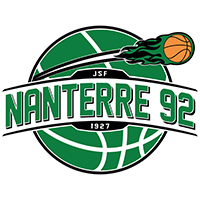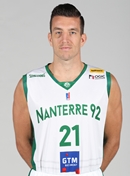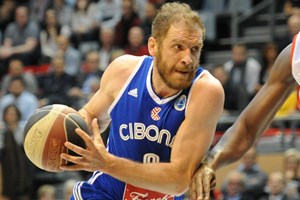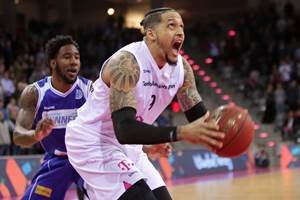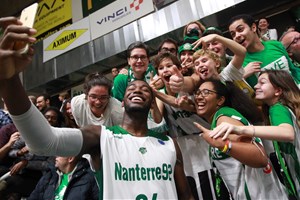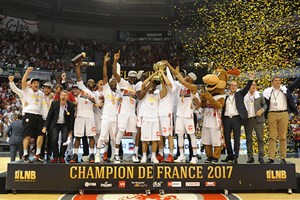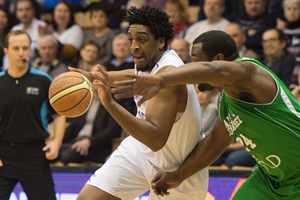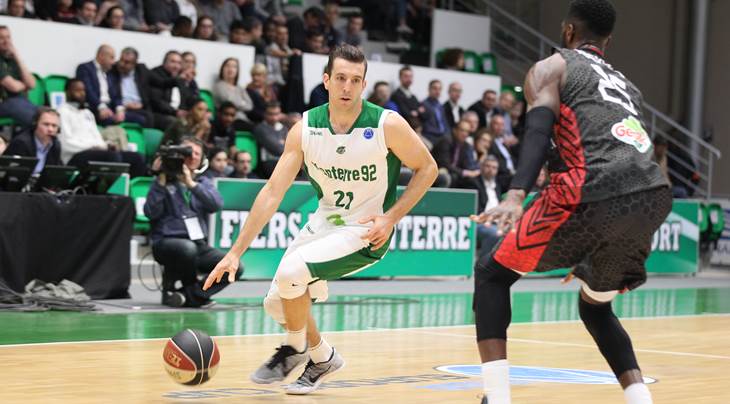
Butterfield hoping to capture the treble with Nanterre 92
NANTERRE (FIBA Europe Cup) - Having burst onto the European scene with Juventus Utena in the FIBA Europe Cup last season, Spencer Butterfield is enjoying an equally impressive second campaign in the competition with Nanterre 92.
The 24-year-old American lights-out shooter from Utah, who has sky-rocketed from the Spanish second division LEB Oro to the French LNB Pro A in a space of two years with an in-between stop in Lithuania, has been one of the cornerstone figures for coach Pascal Donnadieu in Nanterre's pace-and-space offense.
It could well be that the French side might not have gotten over the Quarter-Finals hump, if it wasn't for Butterfield's out-of-this-world performance against Muratbey Usak Sportif in the second leg of the tie, when the guard torched the guests from Turkey with 39 points, setting a new competition record with 11 three-pointers.
We talked to the player about the historic game against Usak, the upcoming Semi-Finals clash against Telekom Baskets, Nanterre's ambitions in all three remaining competitions and the team's up-and-coming young talents – Mathias Lessort and Bathiste Tchouaffe.
We had two historic FIBA Europe Cup games on back-to-back weeks recently. John Roberson exploded for 39 points and 10 three-pointers a week before you scored 39 and hit 11 triples. Were you aware of the big game Roberson had and what was going through your mind, when you caught fire against Usak?
I hadn't seen the actual highlights of Roberson's game, but I heard about it. That being said, I had no idea that I had broken his record. I didn't know at that time. It was definitely one of those times when you're in the zone, I felt that everything that I was throwing up towards the hoop was going in.
Have you ever hit more three-pointers in a single game, say, in high school or college?
No, that was my highest three-point game. I had a 42-point game in college. That was the most points I've ever scored. If I recall correctly, I think I had 7 threes in that game, but 11 three-pointers is my personal best for sure.
Welcome to the Semis Nanterre! #FIBAEuropeCup Quarter-Finals @Nanterre92 110-82 @usaksportif (192-167 on aggr.)
— FIBA Europe Cup (@FIBAEuropeCup) March 14, 2017
📊 https://t.co/PwBqmYNhTT pic.twitter.com/2cZdhkfCl8
You started the FIBA Europe Cup season by winning the first nine games, but have picked up losses here and there since the Second Round. Has the competition gotten much tougher since the Regular Season?
Yeah, I feel the competition is definitely getting tougher. But that's a good thing, that's what you want. That means that the league is competitive, it's weeding out the weaker sides. In the end, you have the best teams left. We're starting to see some better teams and some better quality of opposition.
You're approaching the business end of the competition. Was there a specific moment where it dawned on you that winning an international cup is becoming a growingly realistic possibility?
I think we want to take it one game at a time, but at this stage of the competition, you can see the light at the end of the tunnel. It's definitely more of a realization of "hey, we're pretty close to there." We need to focus and take it game-by-game, but obviously, our ultimate goal is to win the FIBA Europe Cup.
Have you looked at your Semi-Final opponents Telekom Baskets yet or has the focus been on the French Cup Semi-Finals and the upcoming French League game against BCM Gravelines-Dunkerque?
We haven't had a chance to focus on Bonn yet. Every single game is important to us. We wanted to be ready for the French Cup Semi-Finals and qualify for the Finals, which we did. And now our focus turns to the weekend game against Gravelines in the league. When that game is over, we'll start focusing on Bonn. Taking it game by game has been our strategy the whole season and it's been working.
Bravo @Nanterre92 qualifié en finale de la coupe de france @ffbasketball @AccorHotelArena #ambiance merci @fredcute pic.twitter.com/bcolEax0a9
— frédéric tharaud (@FredTharaud) March 21, 2017
Telekom Baskets are probably the deepest team in the competition with an almost 12-man deep rotation. The majority of minutes are split among eight or nine guys in your team. Do you think that might be an important factor in the Semi-Finals?
I don't know their 12-man rotation just yet, but in general it's an advantage for any team if they can have anyone step up and play well. We'll need to be prepared for that. It might be more difficult in that sense, but I honestly feel like we have a lot of depth too.
Anyone who steps on the floor adds something to our team and has the potential to go off any night. I feel we have a lot of really good players on our roster. It may not be a 12-man rotation, but anyone on our bench can be a starter, play big minutes and have a good game. In this aspect, I think we'll be just fine competing against them.
You played both return legs of the Round of 16 and Quarter-Final ties at home. How does playing the first game at home change the dynamics, in your mind?
It does change the dynamics, for sure. Our mindset going to the first game, when we played away, was that we don't necessarily need a win, we just need to keep it close. Obviously, we want to win, but towards the end of the game you start thinking more about strategy and try to make it close, so we can do what we need to advance at home.
This time it's going to be different. We'll need to step on the pedal for all 40 minutes of the game and hopefully get a comfortable margin of victory. That would be the ultimate goal. So that does change things a little, but also — if you win both games, you don't have to worry about that at all.
You have one of the best backcourts in the FIBA Europe Cup, with yourself, Chris Warren and Heiko Schaffartzik and rank among the best three-point shooting teams. What would you say your strengths are?
I think we can spread the floor out a lot. It's hard to guard any professional one-on-one. It's difficult as it is and not being able to help away from shooters makes it an even more difficult task. That opens up the floor for us to run our offense. That's an advantage for us, as we have someone who can shoot it from the three in, really, all positions. That's good for us.
Welcome in semi @TelekomBaskets ! 🏀 #WeAreJSF
— Nanterre 92 (@Nanterre92) March 15, 2017
How would you describe the philosophy of coach Pascal Donnadieu?
That's a good question. I think his philosophy is if you practice hard and you're prepared for the other team, the game will take care of itself. I think he does a good job of preparing us for the other teams and he knows what we need as a team – sometimes it's rest, sometimes we practice harder. He has a good feel for that.
You reached the Final of the French Cup after winning the Semi-Finals against Antibes Sharks, you're through to the FIBA Europe Cup Semi-Finals and you're fourth in the French league right now. How difficult is it to juggle three competitions at a time and where do you lie on the more-practice or more-games scale of the discourse?
I prefer it this way, for sure. I'd rather play more games. I think the rest of the team likes that too. When you have a lot of games, you get used to playing at that speed and get comfortable with the game-rhythm. Generally, the competition is about having fun for us.
Now, we're switching it up between different competitions and every single game means something – you have to win this one to advance in this competition, you have to win that one to move up in the league standings. Always having something to challenge you is good for the mind, good for the body, good for the spirit.
What are your goals in each of the competitions right now?
We definitely want to win the FIBA Europe Cup and the French Cup. I think we want to win the French league as well, but that is, of course, a little bit further down the road. We take it game by game, but the ultimate goal, if you ask anybody, would be to win the Pro A Championship here in France too. If we managed to sweep three of those competitions, that would be pretty good.
You have a couple of intriguing up-and-coming players on your roster: Mathias Lessort is an NBA prospect, Bathiste Tchouaffe is also a very talented young player. Could you talk about both of these guys?
I think one of our strengths is the team chemistry that we have. This group of guys gets along very well, we like to hang out with each other, we can joke about anything and no one is left out. I think it helps these two young guys to feel the chemistry, that bonding we have.
They've been able to learn from some of our veteran guys like Heiko Schaffartzik. He's a really good guy for us. He's helped Lessort's development a lot, he's helped Bathiste become a better player as well.
I think playing against good competition makes you, as a player, raise your game as well and they've done a great job of dealing with that. Their work ethic is second to none – they're always getting shots up before practice, working through extra drills after practice on their own. They're really good at soaking in the information and trying to get better.
Do you still follow the results of your former teams? Juventus, who you represented in the FIBA Europe Cup last year, had a great stretch of play in the Basketball Champions League this season…
Yeah, I did keep an eye on them a little bit. Juventus will always have a special place in my heart, because I like that organization, it was my stepping stone into the next tier of European basketball. This year, they had great success in the Basketball Champions League and they're doing well in the Lithuanian league too. I wish them all the best and will keep following their results. Even after the latest game against Usak, when I made 11 threes, I got a text from their general manager with congratulations. It was nice to hear. I cherish the relationships I have with people from Juventus.
You've been climbing the career ladder – second division in Spain to Lithuania and now to France. Do you also feel like you've improved as a player over these couple of years as well?
Without doubt. I feel like I've gotten better in each place that I've played, taking my set of skills to the next level. Each part of the journey has prepared me for the level above with the help of the clubs and organizations.
Also, I think I learned the European style of basketball. It's a different kind of game and I feel I can use my game a little bit better. When I was younger, I just rolled the ball out and played. Now, I think about it a little bit more strategy-wise. My strengths are as a shooter and I've been trying to focus on that, especially to have confidence in myself. I think my coaches and my team are doing a great job of instilling that confidence in me. A lot of credit to them.
FIBA
